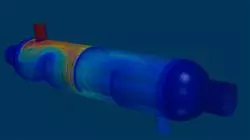University certificate
The world's largest faculty of engineering”
Introduction to the Program
Become an expert in Fluid Modeling in only 6 months"

One of the keys to the study of turbulence is that it cannot be calculated but rather modeled. Even in the case of research, it is done in very simplified domains, using the largest computers in the world for several months. This time and these resources are unattainable for the vast majority of companies, but one of the great advantages of modeling is that it avoids these problems. As a result, the demand for professionals with specialized knowledge in this area continues to increase.
This is the reason why TECH has designed a Postgraduate diplomain Fluid Modeling, to provide students with advanced skills and knowledge in this area, which can guarantee them a successful future as engineers in this field.
Thus, this study plan offers a complete and accurate deepening in topics such as RANS Methods, LES Evolution, the Riemann Problem, Multiphase Flow or Bidirectional Cosimulation, among many other aspects of great relevance.
All this, through a convenient 100% online modality that allows students to combine their studies with their other main obligations, without the need to travel or fixed schedules. In addition, with the possibility of accessing all the theoretical and practical material from the first day, with total freedom and from any device with internet connection, whether mobile, computer or tablet.
Acquire updated knowledge in Fluid Modeling and stand out in a booming sector"
This Postgraduate diploma in Fluid Modeling contains the most complete and up-to-date program on the market. The most important features include:
- The development of case studies presented by experts in Fluid Modeling
- The graphic, schematic, and practical contents with which they are created, provide scientific and practical information on the disciplines that are essential for professional practice
- Practical exercises where self-assessment can be used to improve learning
- Its special emphasis on innovative methodologies
- Theoretical lessons, questions to the expert, debate forums on controversial topics, and individual reflection assignments
- Content that is accessible from any fixed or portable device with an Internet connection
Deepen your knowledge and acquire new skills in Convective Heat Transfer or Bidirectional Cosimulation"
The program’s teaching staff includes professionals from the sector who contribute their work experience to this educational program, as well as renowned specialists from leading societies and prestigious universities.
Its multimedia content, developed with the latest educational technology, will provide the professional with situated and contextual learning, i.e., a simulated environment that will provide an immersive education programmed to learn in real situations.
The design of this program focuses on Problem-Based Learning, by means of which the professional must try to solve the different professional practice situations that are presented throughout the academic course. For this purpose, the student will be assisted by an innovative interactive video system created by renowned experts.
Enroll now and access all the content in Fluid Modeling, with no time limits or need to travel"

Learn all about Solid-Fluid Thermal Coupling, thanks to the most complete theoretical and practical material"
Why study at TECH?
TECH is the world’s largest online university. With an impressive catalog of more than 14,000 university programs available in 11 languages, it is positioned as a leader in employability, with a 99% job placement rate. In addition, it relies on an enormous faculty of more than 6,000 professors of the highest international renown.

Study at the world's largest online university and guarantee your professional success. The future starts at TECH”
The world’s best online university according to FORBES
The prestigious Forbes magazine, specialized in business and finance, has highlighted TECH as “the world's best online university” This is what they have recently stated in an article in their digital edition in which they echo the success story of this institution, “thanks to the academic offer it provides, the selection of its teaching staff, and an innovative learning method aimed at educating the professionals of the future”
A revolutionary study method, a cutting-edge faculty and a practical focus: the key to TECH's success.
The most complete study plans on the university scene
TECH offers the most complete study plans on the university scene, with syllabuses that cover fundamental concepts and, at the same time, the main scientific advances in their specific scientific areas. In addition, these programs are continuously being updated to guarantee students the academic vanguard and the most in-demand professional skills. In this way, the university's qualifications provide its graduates with a significant advantage to propel their careers to success.
TECH offers the most comprehensive and intensive study plans on the current university scene.
A world-class teaching staff
TECH's teaching staff is made up of more than 6,000 professors with the highest international recognition. Professors, researchers and top executives of multinational companies, including Isaiah Covington, performance coach of the Boston Celtics; Magda Romanska, principal investigator at Harvard MetaLAB; Ignacio Wistumba, chairman of the department of translational molecular pathology at MD Anderson Cancer Center; and D.W. Pine, creative director of TIME magazine, among others.
Internationally renowned experts, specialized in different branches of Health, Technology, Communication and Business, form part of the TECH faculty.
A unique learning method
TECH is the first university to use Relearning in all its programs. It is the best online learning methodology, accredited with international teaching quality certifications, provided by prestigious educational agencies. In addition, this disruptive educational model is complemented with the “Case Method”, thereby setting up a unique online teaching strategy. Innovative teaching resources are also implemented, including detailed videos, infographics and interactive summaries.
TECH combines Relearning and the Case Method in all its university programs to guarantee excellent theoretical and practical learning, studying whenever and wherever you want.
The world's largest online university
TECH is the world’s largest online university. We are the largest educational institution, with the best and widest online educational catalog, one hundred percent online and covering the vast majority of areas of knowledge. We offer a large selection of our own degrees and accredited online undergraduate and postgraduate degrees. In total, more than 14,000 university degrees, in eleven different languages, make us the largest educational largest in the world.
TECH has the world's most extensive catalog of academic and official programs, available in more than 11 languages.
Google Premier Partner
The American technology giant has awarded TECH the Google Google Premier Partner badge. This award, which is only available to 3% of the world's companies, highlights the efficient, flexible and tailored experience that this university provides to students. The recognition as a Google Premier Partner not only accredits the maximum rigor, performance and investment in TECH's digital infrastructures, but also places this university as one of the world's leading technology companies.
Google has positioned TECH in the top 3% of the world's most important technology companies by awarding it its Google Premier Partner badge.
The official online university of the NBA
TECH is the official online university of the NBA. Thanks to our agreement with the biggest league in basketball, we offer our students exclusive university programs, as well as a wide variety of educational resources focused on the business of the league and other areas of the sports industry. Each program is made up of a uniquely designed syllabus and features exceptional guest hosts: professionals with a distinguished sports background who will offer their expertise on the most relevant topics.
TECH has been selected by the NBA, the world's top basketball league, as its official online university.
The top-rated university by its students
Students have positioned TECH as the world's top-rated university on the main review websites, with a highest rating of 4.9 out of 5, obtained from more than 1,000 reviews. These results consolidate TECH as the benchmark university institution at an international level, reflecting the excellence and positive impact of its educational model.” reflecting the excellence and positive impact of its educational model.”
TECH is the world’s top-rated university by its students.
Leaders in employability
TECH has managed to become the leading university in employability. 99% of its students obtain jobs in the academic field they have studied, within one year of completing any of the university's programs. A similar number achieve immediate career enhancement. All this thanks to a study methodology that bases its effectiveness on the acquisition of practical skills, which are absolutely necessary for professional development.
99% of TECH graduates find a job within a year of completing their studies.
Postgraduate Certificate in Fluid Modeling
The ability to model and simulate fluid behavior is critical in a wide variety of areas, from engineering to medicine to materials science. For this reason, at TECH Global University we have developed our Postgraduate Diploma in Fluid Modeling program, focused on training experts capable of designing and executing advanced numerical simulations of fluid processes in different contexts. This program provides a solid theoretical foundation in fluid mechanics, thermodynamics and numerical methods, complemented with the teaching of specialized software tools and laboratory practices.
In our Postgraduate Diploma, participants will be able to develop skills for the analysis and simulation of fluid flow processes in complex situations, such as the interaction of fluids with structures, the behavior of non-Newtonian fluids, and the dynamics of gases and liquids in multi-component systems. In addition, the application of fluid modeling in specific areas, such as biomedicine and the energy industry, will be studied in depth. At the end of the program, graduates will be able to apply their knowledge in solving practical problems in the working world and in research in engineering, physics and applied sciences in general.







